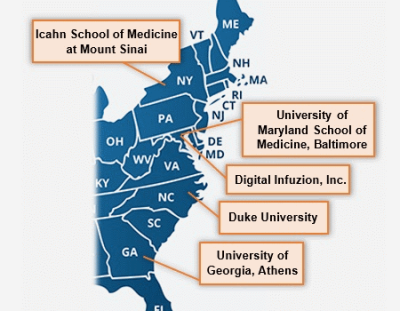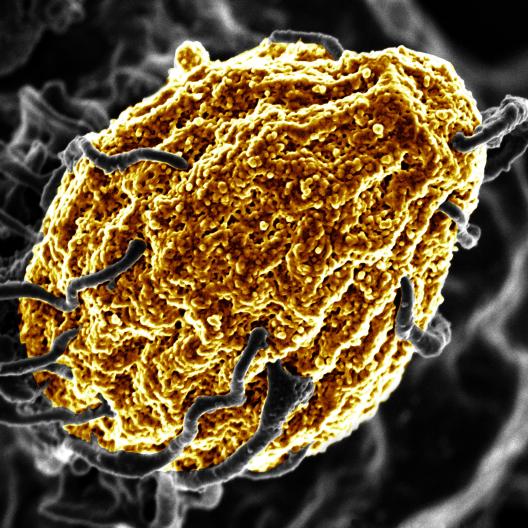The Immune Mechanisms of Protection Against Mycobacterium tuberculosis Centers (IMPAc-TB) program, established by NIAID in 2019, aims to elucidate the immune responses essential for protecting people against infection with Mycobacterium tuberculosis (Mtb). This program will lead to a better understanding of tuberculosis (TB) immunology, which is critical to guide the design and development of new and improved TB vaccines. The program aligns with the goals and objectives of the NIAID Strategic Plan for Tuberculosis Research.
Main Areas of Focus
The IMPAc-TB program aims to develop a comprehensive understanding of the immune responses required to prevent initial infection with Mtb, the establishment of latent infection, and transition to active TB disease. To accomplish these objectives, multidisciplinary research teams conduct immunological analyses of tissue-specific and systemic responses using human samples, combined with assessments using small animals, non-human primates (NHPs) and computational modeling. These integrated approaches are designed to identify the key immune responses needed for protection against Mtb; determine immunologic targets that can be used to improve TB vaccine strategies; determine the impact of human immunodeficiency virus (HIV) and nontuberculous mycobacteria (NTM) infections on relevant immune responses to Mtb infection or TB vaccines; and identify how bacterial immune evasion mechanisms subvert immune responses to Mtb.
Locations
Harvard T.H. Chan School of Public Health, Boston
Principal investigators: Sarah Fortune, M.D. (Harvard); Henry Boom, M.D. (Case Western Reserve University, Cleveland); JoAnne Flynn, Ph.D. (University of Pittsburgh)
Center objective: The goal of this Center is to identify factors that protect people from Mtb infection and to translate these findings into improved vaccine strategies. A multidisciplinary research team assesses samples from NHPs and human cohorts, in whom infection is suppressed, to learn how their immune responses protect them from Mtb infection. Investigators use computational modeling to predict the likely causes of suppressed infections, which is being tested in cellular and small animal models. Studies evaluate the effect of intravenous (IV) Bacille Calmette-Guerin (BCG) vaccination in rhesus macaques in response to Mtb challenge and the immune mechanisms responsible for controlling natural mycobacterial infection in cynomolgus macaques. Studies also examine the effect of Simian Immunodeficiency Virus/SIV infection on IV BCG vaccination using computational modeling and a systems biology approaches. Also, the research team compares the immune correlates of protection observed in the NHP studies with human responses. Human studies conducted by the Center also will also focus on exposed individuals that resist infection or that develop a transient infection response.
Seattle Children's Hospital
Principal investigator: Rhea Coler, Ph.D.
Center objective: This Center will identify the complex immune responses required to prevent Mtb infection or active TB disease by comparing and examining protective immune responses induced by natural mycobacterial infection or vaccines. The research team evaluates recombinant protein vaccines combined with adjuvants to identify and validate common protective correlates of immunity in well-established animal models for TB and human challenge clinical studies where participants are deliberately exposed to BCG (as a controlled human infection model) under carefully controlled conditions. The investigational vaccines being evaluated are ID93 and M72 formulated with GLA-SE and other adjuvants developed by Access to Advanced Health Institute (AAHI) and contractors supported by NIAID’s Division of Allergy, Immunology, and Transplantation’s (DAIT) adjuvant program. The studies also address how immunity from previous BCG vaccination and natural nontuberculous mycobacteria (NTM) infection affects the investigational vaccines’ effectiveness and ability to generate an immune response across species. The studies will provide crucial insights into the development of candidate vaccines that generate robust levels of durable, protective immunity against TB.
Seattle Children’s Hospital
Principal investigator: Kevin Urdahl, M.D., Ph.D.
Center objective: The goal of this Center is to inform the design of an effective TB vaccine by identifying the immune responses capable of controlling and potentially eradicating Mtb. The research team is identifying and examining protective pathways in natural and vaccine-induced immunity by analyzing tissue-specific and systemic immunity in mice, NHPs, and humans. Investigators are focusing on immune correlates at three stages: the pre-infection immune stage; the early events after pulmonary infection; and the formation of granulomas (compact, organized structures of immune cells) during chronic infection. These studies will identify the immune responses required to protect the host from initial infection, establish latent infection, and prevent progression to active TB disease.
Contact Information
Dr. Que Dang, Division of AIDS (DAIDS)
Dr. Nancy Vázquez, Division of Allergy, Immunology, and Transplantation (DAIT)
Dr. Katrin Eichelberg, Division of Microbiology and Infectious Diseases (DMID)



